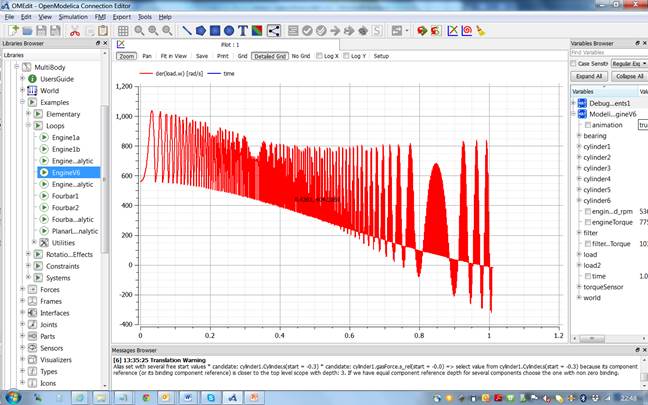Open Modellica '16
8th Open Modelica Annual Workshop
Special theme for this year: Open Source and Open Source Business Models.
Several half-day tutorials on topics like Modelica and OpenModelica, FMI and co-simulation, etc.
Stay tuned for more information.
This OpenModelica 1.9.3 release includes a number of improvements compared to the 1.9.2 release. The most important are the following:

Fig 1. OpenModelica graphic user interface, here simulation of the V6Engine motor model.
- Further improved simulation speed and coverage of several Modelica model libraries, e.g., by faster generated code for functions involving arrays giving a factor of two speedup for many power plant models.
- Several improvements of the Dynamic Optimization module with collocation (described here): Better performance due to smart treatment of algebraic loops for optimization. Improved formulation of optimization problems with an annotation approach which also allows graphical problem formulation. Support for formulating final constraints.
- GUI and plotting improvements (described here): Support for uses annotations. Support for declaring components as vectors. Faster messages browser with clickable error messages. Support for managing the stacking order of graphical shapes. Several improvements to the plot tool and text editor in OMEdit. OMNotebook improvements.
- A number of compiler improvements including: Code generation to enable vectorization of for-loops. Cross-compilation for the ARMhf architecture. A prototype state machine implementation.
- A number of run-time and solver improvements including: Better initialization. An implicit inline Euler solver with adaptive step size control available. Improved non-linear, linear, and mixed system solving. Improved performance and stability of the C++ run-time option.
- More accessible and up-to-date automatically generated documentation provided in both html and pdf.
- Enhanced collaborative development and testing of OpenModelica by moving to the GIT-hub framework for versioning and parallel development.
The development work is organized by the Open Source Modelica Consortium, currently 46 organizations.
Thanks to all who contributed and worked hard for this release!
Best regards,
Peter Fritzson
Submitted by Anonymous
on
8th Open Modelica Annual Workshop
Special theme for this year: Open Source and Open Source Business Models.
Several half-day tutorials on topics like Modelica and OpenModelica, FMI and co-simulation, etc.
Stay tuned for more information.
This OpenModelica 1.9.3 release includes a number of improvements compared to the 1.9.2 release. The most important are the following:

Fig 1. OpenModelica graphic user interface, here simulation of the V6Engine motor model.
- Further improved simulation speed and coverage of several Modelica model libraries, e.g., by faster generated code for functions involving arrays giving a factor of two speedup for many power plant models.
- Several improvements of the Dynamic Optimization module with collocation (described here): Better performance due to smart treatment of algebraic loops for optimization. Improved formulation of optimization problems with an annotation approach which also allows graphical problem formulation. Support for formulating final constraints.
- GUI and plotting improvements (described here): Support for uses annotations. Support for declaring components as vectors. Faster messages browser with clickable error messages. Support for managing the stacking order of graphical shapes. Several improvements to the plot tool and text editor in OMEdit. OMNotebook improvements.
- A number of compiler improvements including: Code generation to enable vectorization of for-loops. Cross-compilation for the ARMhf architecture. A prototype state machine implementation.
- A number of run-time and solver improvements including: Better initialization. An implicit inline Euler solver with adaptive step size control available. Improved non-linear, linear, and mixed system solving. Improved performance and stability of the C++ run-time option.
- More accessible and up-to-date automatically generated documentation provided in both html and pdf.
- Enhanced collaborative development and testing of OpenModelica by moving to the GIT-hub framework for versioning and parallel development.
The development work is organized by the Open Source Modelica Consortium, currently 46 organizations.
Thanks to all who contributed and worked hard for this release!
Best regards,
Peter Fritzson
Submitted by Anonymous
on